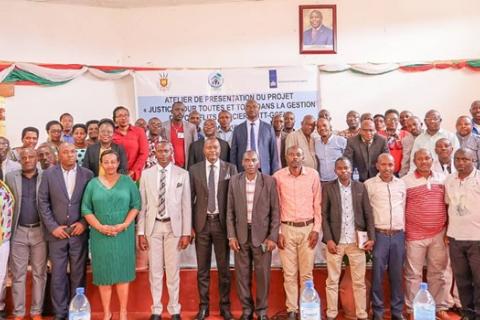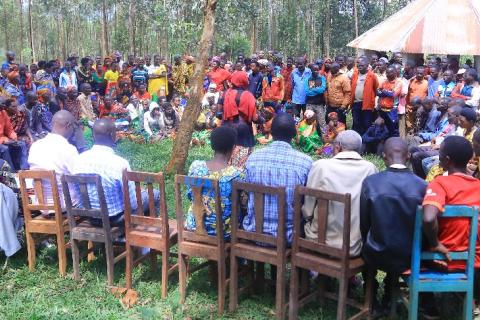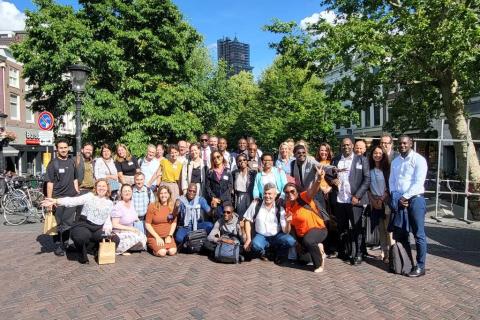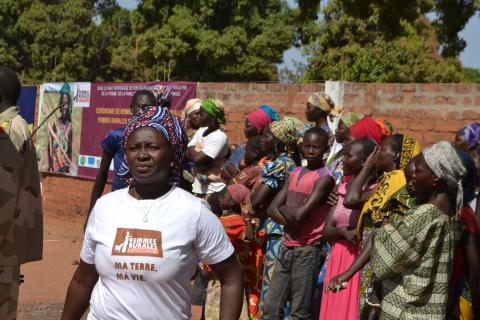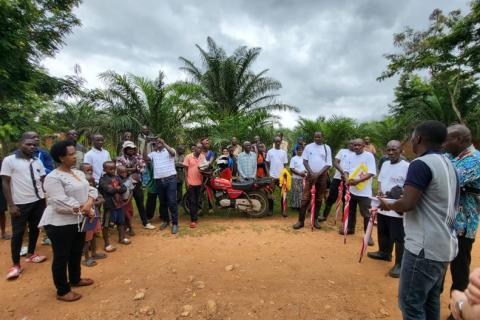Program Advisor LAND-at-scale at RVO, the Netherlands Enterprise Agency.
Details
Website
Location
Contributions
Displaying 1 - 10 of 61LAND-at-scale Exchange 2024 Summary Report
After two years of organizing the LAND-at-scale Exchange in Utrecht, the third LAND-at-scale exchange took place from June 9th to June 13th in Uganda, hosted by LAS partner UN-Habitat/ Global Land Tool Network. Nearly 60 LAS country and knowledge partners came together in Kampala to exchange lessons learned and explore common challenges. As of 2024, twelve country projects are being implemented under the LAS program, namely Burkina Faso, Burundi, Chad, Colombia, Egypt, Iraq, Mali, Mozambique, the Palestinian Territories, Somalia, Rwanda and Uganda.
Le Projet « Justice pour Toutes et Tous dans la Gestion des Conflits Fonciers » bien accueilli par les autorités étatiques et locales
“Justice for all in the management of land conflicts ”: Introducing a new LAND-at-scale project in Burundi
Launching the LAND-at-scale project in Iraq
Scaling in Context – Towards responsible scaling in land governance interventions
LAND-at-scale (LAS) is a land governance support program for developing countries from the Ministry of Foreign Affairs of the Netherlands, which was launched in 2019. The objective of the program is to directly strengthen essential land governance components for men, women and youth that have the potential to contribute to structural, just, sustainable and inclusive change at scale in lower- and middle-income countries/regions/landscapes.
Looking back at the LAND-at-scale Exchange 2023: Scaling as the way Forward
The second LAND-at-scale (LAS) exchange took place from June 26th to June 28th, 2023. Sixty partners came together in Utrecht, the Netherlands to exchange lessons learned and explore common challenges. As of 2023, ten country projects are currently being implemented under the LAS program, namely Burkina Faso, Burundi, Chad, Colombia, Mali, Mozambique, the Palestinian Territories, Somalia, Rwanda and Uganda. All countries were represented and almost all implementing partners were present at the Exchange.
Scaling readiness: experiences from the CGIAR scaling readiness approach
Challenges with regards to scaling is not unique to the land sector. Working in the context of agriculture for development, CGIAR and Wageningen University developed the Scaling Readiness approach. This approach response to the fact that the pressure to demonstrate fast and visible results and impact at scale, has sometimes resulted in unreasonable and unrealistic expectations, and in fact stimulated simplistic and non-sustainable scaling approaches.
LAND-at-scale Chad: Collective action to bring land to the national political agenda
Chad is at the verge of an emerging land tenure crisis. As observed in many countries in Africa, formal and customary tenure systems overlap. Customary tenure systems, that generally prevail in rural areas, differ from region to region, with each its own needs and practices. Land conflicts are abundant, caused by degradation and transformation of land surfaces caused by climate change, as well as land investments by domestic investors with disputed legitimacy.
LAND-at-scale Burundi: The need for a unified vision for inclusive and sustainable land governance
Burundi has the world’s highest hunger score and around 45 percent of the population is affected by food insecurity. The country copes with increasing scarcity of land as a result of increasing population size, returnees and IDPs and climate change. With the majority of Burundians depending on agriculture for their food and livelihoods, land scarcity makes this reliance on agriculture precarious. This pressure on land causes elevated levels of land disputes with over 55% of all court cases being related to conflicts over land.
Scaling as the way forward: defining and understanding scaling
Scaling is at the heart of both the name as well as the strategy of LAND-at-scale. Scaling and scaling potential are key in the way the program was designed and is reflected in the three pillars chosen to realize the aim of the program. The first pillar is about scaling successful initiatives and projects; the second pillar focuses on land governance innovations with scaling potential; and the third pillar covers knowledge management, with a focus on gaining a deeper understanding on the conditions required to make scaling successful.


